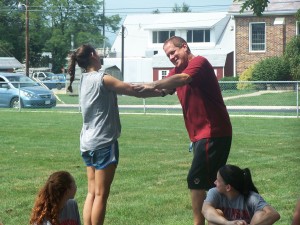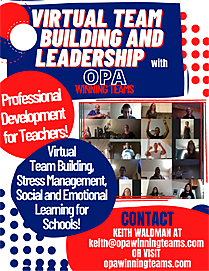 One of the biggest challenges facing coaches is building the self-confidence of their players. An athlete’s self-esteem cannot be overlooked. Getting your players to play with confidence is one of the keys in developing a successful team. I have found that coaches have a significant impact on a player’s self-worth and they can promote self-confidence in the athletic arena.
One of the biggest challenges facing coaches is building the self-confidence of their players. An athlete’s self-esteem cannot be overlooked. Getting your players to play with confidence is one of the keys in developing a successful team. I have found that coaches have a significant impact on a player’s self-worth and they can promote self-confidence in the athletic arena.
Confident athletes have strong positive thoughts and images running through their mind. They see themselves playing well and making great plays and they always look calm and in control. They stand tall and exude themselves with confidence. Championship coaching involves the coach guiding athletes to believe in themselves. The first step for a coach is to understand the basic needs of your players that promote self-esteem. The cornerstones of self-esteem are the following: 1) Players need to be accepted and feel a sense of belonging, 2) They need to feel significant, 3) They need to feel capable or competent, and 4) They need to feel safe.
Here are a few simple tips that can promote the self-esteem of your players:
Step 1: Treat your athletes with respect. If you treat your athletes by demeaning and humiliating them they will grow to resent you and hate the sport.
Step 2: Inspire your athletes towards greatness. Emphasize your player’s strengths and encourage your players to learn from their mistakes. A coach who consistently gets down on his/her players does not provide a positive working environment and as a result can decrease an athlete’s motivation.
Step 3: Remember failure is an event not a person. It’s very important that players do not connect their self-esteem to wins and losses. There are many factors outside the control of the athlete that can impact on whether a team wins or looses. Have them focus on the process and the things they control, such as their performance and how they react to situations. In competition there are many losers and only one winner. Encourage your players to learn from failure and turn them into future challenges.
Step 4: Preparation, Preparation Preparation. I have found that mental and physical preparation is one of the most powerful means of gaining confidence. The more prepared you are mentally & physically the more confident you will feel. Many games are won or lost because of mental and physical preparation or a lack of preparation.
Step 5: Challenge your players. Encourage your athletes to set challenging but attainable goals that will get them to stretch themselves. Emphasize performance rather than outcome goals. Set daily and short-term goals rather than long-term goals. Short term and daily goals are the steps towards success and daily will build confidence.
Step 6: Positive Communication. Be open and honest with your players. Let them clearly know how you feel and what is going on. Players cannot read your mind. Listening to your players will validate player’s feelings and help promote good working relationships with them. Yes, you can validate their feeling even though you may disagree with them and not change a decision. Use active listening skills. Attend and respond accurately and sensitively to the verbal and nonverbal messages that are coming from your players.
Step 7: Handle failures, setbacks, and mistakes constructively. Teach your players that failures and mistakes are a necessary part of learning. Dare your players to risk failure. The player that does not dare to risk misses opportunity. Remember the saying “You Miss 100% of the shots you do not take.” If you jump in an athlete’s face and yell at them when they make a mistake you are teaching them to worry about making mistakes and question their own abilities. Not only this will hurt their confidence it will hurt their focus. Remember, “FAILURE IS FERTILIZER”.
Step 8: Empathize not sympathize: Try to understand your player’s point of view and respect where they are coming from. If your athletes feel that you understand them they will feel cared about and valued. It’s ok to view the world from their perspective.
Step 9: Avoid unhealthy comparisons between teammates. It’s ok to create a competitive environment but do not make a player feel bad because they are not like another player on the team.
Step 10: Use recognition. Catch your players doing something good. Recognition and positive reinforcement are one of the most powerful techniques that can promote motivation and self-confidence. Simple recognition will take you a long way.
Step 11: Help your players use affirmations & positive self-talk. Encourage your athlete to use positive self-talk and use daily affirmations as part of their daily routines. What you believe to be true usually determines your successes, your failures, your ability to risk, and your strength to handle any situation. Positive thinking and positive self-talk are one of keys succeeding in sport and in life. The power behind this technique is found in the adage, “You become what you think about most of the time.”
Step 12: Remember “WIN” – What’s Important Now. To compete with confidence your players need to stay focused on the present. Remind your players not over obsess about a mistake you made or shots that you missed. Learn from that mistake and move on quickly. If you keep yourself mentally in the past you will be stuck in mental quicksand and you will loose concentration, focus, and confidence. If a mistake is made stay calm and shift your mental attention to the upcoming play. Letting go of the past, forgiving yourself for the error, and refocusing on the present moment are crucial for getting beyond the mistakes.
 Keith Waldman Bio: Mr. Keith Waldman received his BA inPsychology at SUNY at Plattsburgh, a
Keith Waldman Bio: Mr. Keith Waldman received his BA inPsychology at SUNY at Plattsburgh, a
Masters in Social Work from the University of Michigan and a Masters Degree in Sport Psychology from Temple University and he has extensive training in adventure education from Project Adventure Inc. Keith has been actively involved in a wide variety of public and private organizations focusing on interpersonal practice, teambuilding, and sport psychology. Keith has been a popular speaker for many collegiate and high school athletic programs and conferences. He has conducted hundreds of workshops for sport teams and athletic departments across the nation, including State, Conference, and National Championship Teams. In addition to his work with athletics Keith has facilitated hundreds of exciting workshops for many K-12 schools and corporations, including many Fortune 500 companies focusing on teambuilding, leadership, and interpersonal practice. His passion and commitment as well as his educational and professional experience have enabled Keith to make a tremendous impact on many athletic, educational, and corporate teams.



